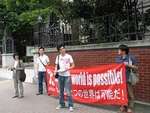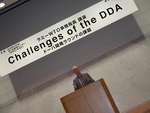Yoko Akimoto, ATTAC Japan
Lamy's behind-the-scenes maneuvering

Lamy said at the press conference, "I found that Japan is ready to show flexibility in negotiations." However, the media reported that there was little hope for Japanese concession, although Lamy told reporters that he got positive answers from PM Koizumi that Japan would contribute to building consensus for success in negotiations and from Minister of Economy, Trade and Industry Nikai that he would support Doha Round in cooperation with the industrial circles like Nippon Keidanren or Japan Business Foundation (http://www.keidanren.or.jp/index.html). According to the press, Minister of Agriculture, Forestry and Fisheries Nakagawa didn't say Yes to tariff reduction. He just asked Lamy to understand Japanese position of small tariff reduction, explaining Japanese agricultural situations. Some officials of the Ministry of Agriculture, Forestry and Fisheries, apparently determined to adopt a wait-and-see attitude, said to the press, "Japan will keep it close to the chest before other members climb down".
 "Challenge of DDA"
"Challenge of DDA"
Lamy addressed a speech under the title of "Challenge of DDA" at the WTO Research Center of Aoyama University. Lamy said that he was given a mandate to coordinate positions among members to seek a common landing site. In addition to members' unyielding stance, he said that a higher level of ambition in Doha Round than previous rounds accounted for stalemated talks. For this reason, according to him, members should need political courage. He also admitted that, if talks shall fail, it would involve big risk, and there would be no way but keeping the risk at a minimum. In conclusion he requested the government to continue its contribution to Aid for Trade, praising Japan's efforts for it.
Lamy responded to questions from the floor.
Yasuaki Yamaura of Consumers' Union of Japan, part of our No To WTO Coalition, threw some questions at him, "The free trade system is causing adverse effects on the economy in developing countries. The philosophy of the WTO is a sort of Utopia. The free trade is not fair. Consumers are anxious about the outcome of the WTO besides BSE(mad cow disease) and GMO issues."
Lamy answered, "Collapse of Doha Round will also lead to a demerit to developing countries. The WTO gives developing countries a chance to speak out their own views. If the WTO disappears, it would cause control by big powers. You are emphasizing developing countries, but as far as I know, they have demanded market access. You should listen to local people of developing countries. If you are a consumer, you should promote international specialization which will enable you to buy cheaper goods."
I myself tried to follow him to hurl questions, but I was rejected, possibly because we handed out leaflets saying "Just Say NO!", "Scrap Doha Round Now!" at the entrance before the session. (http://attaction.seesaa.net/article/20432693.html#more)
Most of his audience of 100 or more concerned about the impasse of the Doha Round who apparently endorse Doha Round may have been satisfied with his new decision and mandate to save the situation.
Economic newspaper says…
The Nihon Keizai Shimbun or Japanese Economic Newspaper said in an editorial on July 7, "There is still time. It is too early to conclude that we cannot come to an agreement on the Round before the end of this year. Japan has the duty to continue to support Lamy's efforts for coordination. Japan should take the lead in showing flexibility in market access of agricultural products; otherwise the US and EU couldn't move ahead easily even if they have any intention to do so. Lamy has a professional skill called "Confession session" where he meets alone with one delegate to grasp his/her final defensive line for concession. Japan was the first country Lamy chose for his session. He earns the trust of each delegate which should be an absolute condition for his confession session. Once the Ministerial meeting failed, there is no option other than to trust him and expect his ability of coordination. G8 leaders must express their strong will to get forward the round at the Summit, resolutely confirming that there will be no going back. Market opening and tariff reduction involve pain temporarily, but the WTO is the only stage of trade negotiation at which almost all countries in the world could get something out of liberalization all together."
Domestic situation
There is still strong resistance to tariff reduction from agricultural groups. Even the Central Union of Agricultural Cooperatives, a biggest nation-wide organization which has supported the Liberal Democratic Party (LDP) for long periods, opposes tariff reduction. That's the reason Agricultural Minister Nakagawa couldn't accept Lamy's request for concession. If he said Yes to Lamy, his party LDP would inevitably lose huge support in the Upper House election scheduled for next year. However, Nakagawa is firmly convinced of the significance of the Doha Round, feeling much pressure from the business circle and other Ministries.
Accordingly, the point is: when will he convert? I see he is planning at heart to accept concession. He met with Lamy to open up his complicated position and heart to him. Perhaps Lamy understood him very well and grabbed a clue to melting down conflicts through discussion with Nakagawa.
Nakagawa as well as the government may make Lamy's visit to Tokyo a pretext for concession, accompanied with reasons that the country shouldn't collapse the Doha Round to get much larger profit from the Round in general, it shouldn't stick to high tariff of rice, and Japanese farmers should make efforts to produce export-oriented competitive products, which is just what the Keidanren has consistently maintained since last year.
The new agricultural policy – the largest revision in the postwar periods – will be introduced next year. Under the policy, only large-scale farmers will be provided subsidy and formation of agricultural corporations is encouraged. It may cause many farmers to quit farming. Hence, the government may think that now is the time to move or it's time to express concession officially.
Japanese farmers have been protected under the state policy. They were criticized for their vested interest by the business circle and media particularly last year when the topic of postal privatization became the subject of heated debate. Now the Koizumi administration is trying to abandon so many small-scale farmers.
Observation
Once stage is set, the government is ready to accept concession. Lamy may try to set a stage in a way that the Japanese government would be satisfied with – that is, other members could be convinced that Japan as a key player within the WTO did a lot to the success of the Doha Round by offering a breakthrough.








